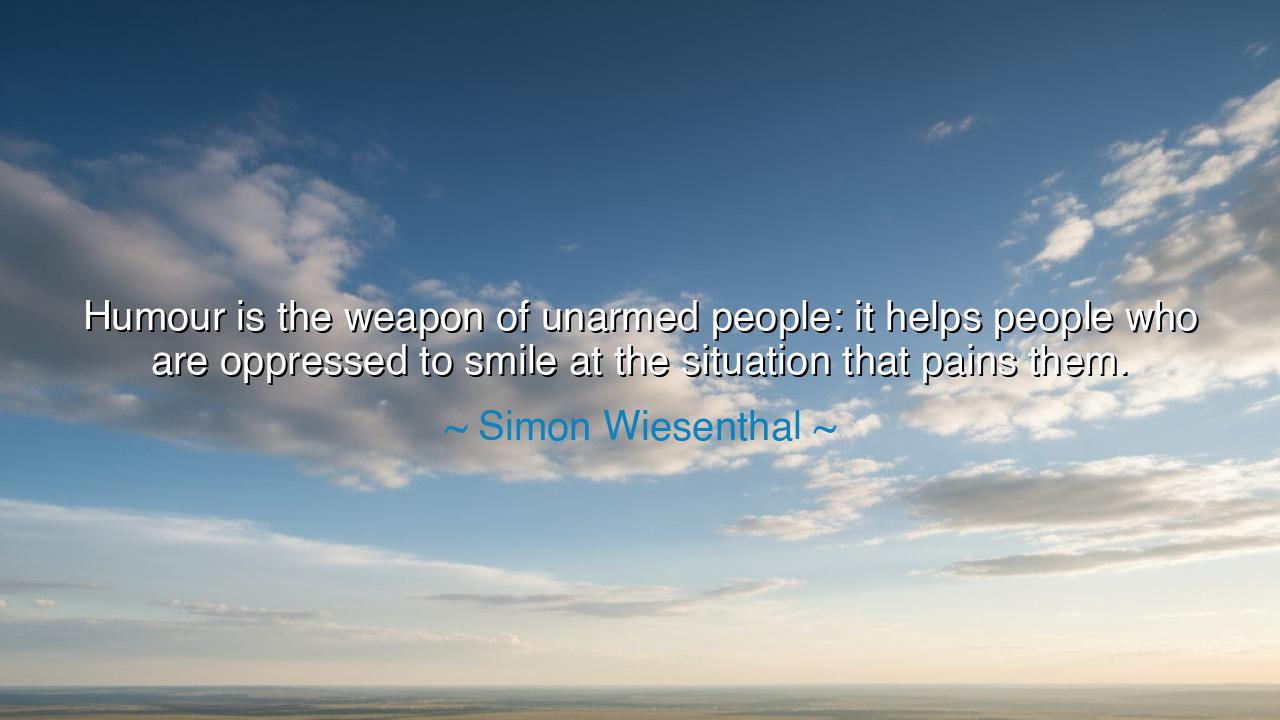
Humour is the weapon of unarmed people: it helps people who are
Humour is the weapon of unarmed people: it helps people who are oppressed to smile at the situation that pains them.






The words of Simon Wiesenthal, survivor of the Holocaust and tireless seeker of justice, ring through time like a solemn hymn of endurance: “Humour is the weapon of unarmed people: it helps people who are oppressed to smile at the situation that pains them.” In this simple truth lies a power greater than any sword, for humor—when born from suffering—is not mere jest, but rebellion of the spirit. It is the flame that flickers in darkness yet refuses to be extinguished. Wiesenthal, who witnessed the depths of human cruelty, understood that laughter could become the last defense of dignity when every other weapon had been stripped away.
The unarmed people of history—those conquered, silenced, imprisoned—have always found refuge in laughter. It is the one liberty tyrants cannot fully steal, for it arises from within the soul. To laugh in the face of oppression is to declare, “You have taken my body, but you cannot take my humanity.” In ghettos, prisons, and camps, men and women whispered jokes that mocked their captors, not out of ignorance, but out of courage. Humor gave them breath when fear suffocated, light when despair encircled. It transformed agony into defiance, weakness into strength.
There is a story told from the dark days of the Holocaust: in the barracks of Auschwitz, where death hung like mist, prisoners would whisper ironic quips about the absurdity of their suffering. One man, after being forced to line up for “work,” said quietly, “At least they still think we’re useful.” Those around him laughed—a soft, trembling laugh—but it was enough. In that moment, the Nazi overseers held power over their bodies, but not their souls. Their laughter was a revolt, a declaration that they were still human, still alive, still capable of joy. Wiesenthal, who lived through those horrors, understood that such laughter was not foolishness—it was heroism.
The ancients, too, understood that humor can be a shield against despair. When Diogenes the Cynic mocked the kings of Greece by living in a barrel and laughing at their pride, his wit became his armor. He possessed nothing, yet feared no one. Laughter, when used with wisdom, disarms tyranny. It exposes vanity, softens cruelty, and allows the powerless to look upon their oppressors not with hatred, but with irony. And irony, as Wiesenthal knew, is a form of truth that no lie can completely destroy.
In our time, the lesson remains urgent. Many still live under oppression—not only political, but emotional, social, and spiritual. There are those enslaved by fear, burdened by injustice, or silenced by power. To them, Wiesenthal’s words are a torch: humor is not escape, but endurance. It is a way to reclaim control over one’s own soul, even when the world denies every other freedom. The oppressed who can still laugh hold a secret power that no regime can crush—the power of the unconquered mind.
Consider the story of Nelson Mandela, imprisoned for twenty-seven years under apartheid. Even in the harsh confines of Robben Island, he was known for his quiet wit. He once joked to a guard about their shared humanity, saying, “If you don’t behave, I’ll escape and run for president.” Years later, he did exactly that. Mandela’s humor was not mockery—it was faith in the absurdity of injustice, and in the inevitable triumph of grace over cruelty. Like Wiesenthal, he wielded laughter not as a distraction, but as a weapon of peace.
Thus, the wisdom of this quote is both ancient and eternal: humor is strength disguised as gentleness. It allows the oppressed to rise without hatred, to see light in darkness, to reclaim the sacred gift of perspective. The tyrant cannot comprehend why his victims still smile, for he does not understand that true power lies not in control, but in resilience. To laugh, even through tears, is to affirm that life is greater than suffering.
So, my child of tomorrow, remember this: when the world bears down upon you, do not surrender your smile. Let your humor be your fortress, your song, your rebellion. Laugh not to forget, but to survive. Laugh, for in your laughter lives the unbroken will of all who came before you—and through it, the promise that no darkness can ever wholly defeat the light.






AAdministratorAdministrator
Welcome, honored guests. Please leave a comment, we will respond soon